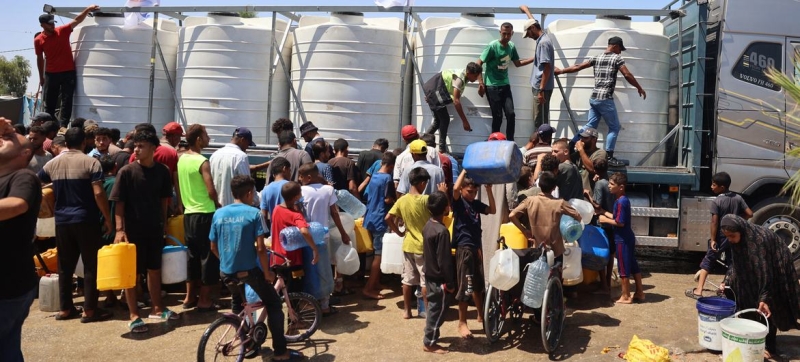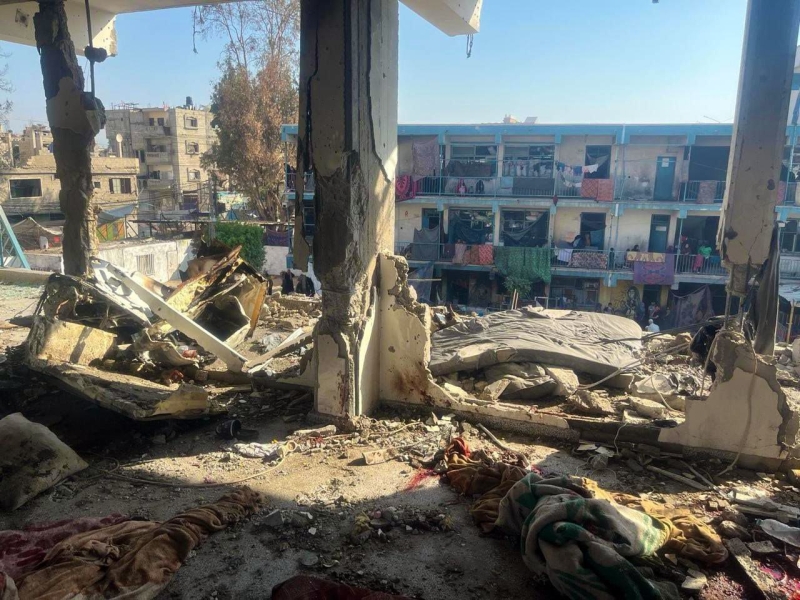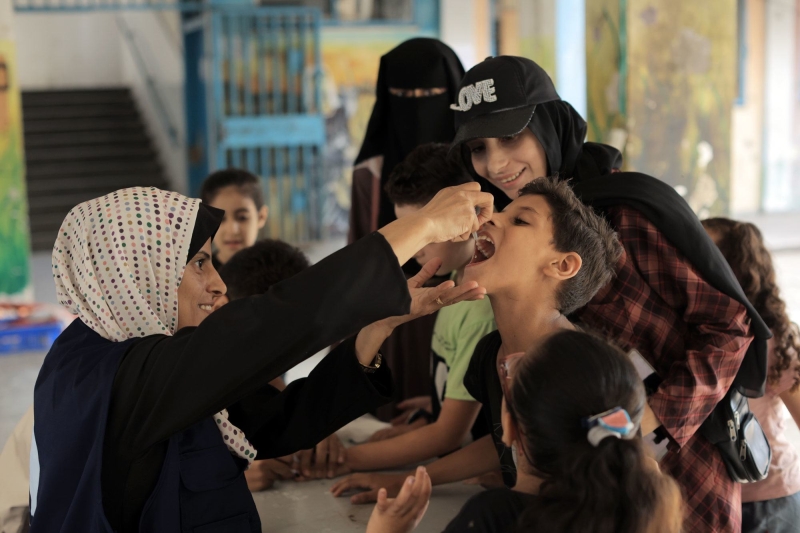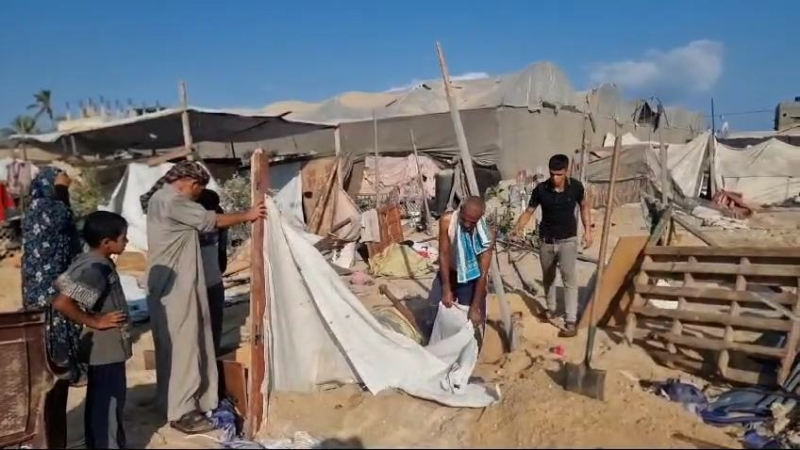
Families in Gaza collect water provided with UNICEF support. EXPLAINED | Humanitarian aid – or lack thereof – in Gaza Humanitarian aid
A relentless siege, deadly shelling and ongoing restrictions on aid deliveries are just some of the challenges facing aid workers in Gaza.
The amount of aid coming into the enclave is too little compared to the needs of its 2.3 million residents, who are trapped in a war that began nearly a year ago after Hamas-led attacks. More than a thousand people were killed in Israel at the time and about 250 were taken hostage.
As a result of the military actions, Palestinians in Gaza are facing food shortages, the spread of disease, destruction, shortages of basic necessities and a lack of access to health care, water and sanitation.
Supply Cuts
Routes into the besieged Gaza Strip, surrounded by Israel to the north and east and Egypt to the south, lie through Israeli-controlled borders.
Before the war, about 500 trucks carrying commercial and humanitarian supplies entered the enclave every day. Now their numbers have dropped sharply. In all of August, only 1,559 trucks entered Gaza through the Kerem Shalom and Rafah border crossings.

UNRWA schools that serve as shelters are being targeted.
Between September 1 and 15, Israeli authorities facilitated only 37 (or 39 percent) of the 94 planned humanitarian missions to the northern part of the Strip. A total of 25 (or 27 percent) of them were denied access, according to the UN Office for the Coordination of Humanitarian Affairs (OCHA).
In southern Gaza, out of 243 planned aid visits, the Israeli authorities facilitated only 129, or 53 percent, denying access to 41 of them (17 percent).
OCHA cites ongoing fighting, access restrictions and damage to infrastructure, as well as the deteriorating security situation, including looting and evacuation orders, as key factors impeding aid delivery.
Efforts Israel
According to statements by Israeli officials, the country is providing sufficient support to civilians in the Gaza Strip.
Israel’s humanitarian efforts are “unparalleled,” according to Israel’s permanent representative to the UN, Danny Danon.
“We have facilitated the delivery of over a million tons of aid, including 800,000 tons of food aid,” he said. – We have made it clear that we are more than willing to work with agencies that are willing to cooperate with us.”
Timely access
The UN Senior Humanitarian and Reconstruction Coordinator for Gaza, Sigrid Kaag, said she and her team had held constructive meetings with the Israeli authorities at the highest level, but there was still a need to scale up aid in the enclave.
Read also:
UN: Efforts to save Gaza civilians must be stepped up
She said it was not how many trucks were crossing the borders that mattered, but what people across Gaza were receiving and when, warning that the needs of the enclave’s residents were outstripping the aid being delivered.
Briefing the Security Council on Monday, she said delays in aid could have dire consequences.
Obstacles and Restrictions
The recent UN-led polio vaccination campaign demonstrated that timely deliveries to Gaza were possible. However, humanitarian agencies on the ground continue to face restrictions and delays.

Over 560,000 children in Gaza have received their first dose of polio vaccine.
“The restrictions imposed by the Israeli authorities on the import of essential items are particularly dangerous for children, pregnant women and people with weakened immune systems, and are also increasing tension and anxiety in overcrowded shelters,” aid officials said.
Meanwhile, OCHA reported that aid convoys were being shelled and held for hours in combat zones. The World Food Programme (WFP) was forced to suspend its operations after Israeli forces fired on its vehicles. To date, more than 200 UN staff have been killed in Israeli strikes in Gaza.
Emergency Supplies
Humanitarian efforts are organized through specialized clusters on topics ranging from health to shelter.
Organizations specializing in health, water, sanitation and hygiene recently warned of a severe shortage of soap and other hygiene products in Gaza needed to prevent the spread of diarrhea and other diseases. The UN Refugee Agency (UNRWA) warned on Monday that sanitary conditions in Gaza were deteriorating by the day.
Another problem is the lack of shelters. As of Monday, about 86 percent of Gaza was under evacuation orders, OCHA said. The UN agency stressed that such Israeli measures, without ensuring that displaced people have safe places to stay, are worsening the humanitarian crisis for hundreds of thousands of people.

Temporary shelters in southern Gaza.
According to the UN, 1.13 million people need materials for makeshift shelters or tents, while 1.34 million people lack bedding.
At least 25,000 shelter sealing kits – about 25 truckloads – are to be delivered to southern Gaza every week to prepare for the cold and rainy weather that will arrive in November.
As part of an inter-agency initiative led by the UN Refugee Agency (UNHCR), an average of two truckloads of shelter improvement supplies arrived in southern Gaza every week in August. At this rate, it will take the agencies two years to provide the basic assistance needed to prepare for winter.
DAccess to northern Gaza
Crisis conditions persist in the northern areas of the enclave, but OCHA has been unable to access the area for four weeks, the UN office said on Monday.
“Israeli denials and restrictions on access, among other difficulties, are hampering the ability of humanitarian missions to assess needs, coordinate responses, receive supplies and prepare for the rainy season in the north,” OCHA said.
Restricted access to northern Gaza continues to impact the well-being of hundreds of thousands of people who live in appalling conditions and suffer from acute shortages of basic necessities.
